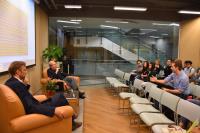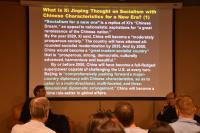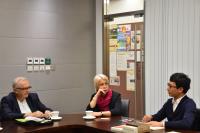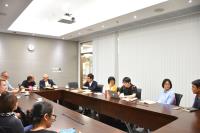1 November 2017
The 19th Party Congress: What Will Xi Jinping Use His Power for?
In the aftermath of the Communist Party of China's Nineteenth Party Congress, questions abounded about China's future political direction under Xi Jinping. On November 1, Prof. Willy Lam, Adjunct Professor at CUHK's Centre for China Studies, offered an assessment of the potential for political and socioeconomic reform at a time when Xi's authority is at a historically high level in post-Mao China. A veteran China watcher, Prof. Lam also addressed the challenges posed by Xi's preference for a resurgent state sector in the economy and tighter control over civil society. In light of the major changes brought by Xi's presidency, Prof. Lam also had the chance to present the new volume he edited with the title Routledge Handbook of the Chinese Communist Party, containing the most up-to-date academic work on all major facets of the CCP.
6 November 2017
Part Tiger, Part Monkey: Mao Zedong and China's Destiny
On November 6, Prof. Alain Roux, Emeritus Professor at the National Institute of Oriental Languages and Civilizations (INALCO) in France, provided a far-ranging assessment of Mao as a historical figure, looking at both the man and the myth. Prof. Leung Yuen Sang, Dean of the Faculty of Arts at CUHK, and Mr. Eric Berti, Consul General of France in Hong Kong and Macau, offered welcoming speeches in honour of Prof. Roux. Dr. Eric Florence, Director of the French Centre for Research on Contemporary China, served as the host, while Prof. Jan Kiely and Prof. Michel Bonnin from the Centre for China Studies acted as discussants.
As a young Maoist, Prof. Roux was invited to the PRC on the eve of the Cultural Revolution, where he witnessed in person the violent excesses of the late 1960s, leading to a complete change of his views on Mao. These experiences compelled him to embark on his life-long quest to understand Mao and Mao's China.
Having recently published a masterful four-volume biography on Mao, Prof. Roux drew a nuanced and detailed portrait of Mao from the 1910s to his death in 1976 based on the PRC founder's self-description: "having both some of the spirit of the tiger which is dominant, but also some of the spirit of the monkey which is secondary." In addition to the more historical discussion, Prof. Roux also answered questions related to Mao's continuing influence and relevance for contemporary Chinese politics.
17 November 2017
Rethinking Post-Mao China's Educational Record - and Its Lessons for Elsewhere
As a result of increased attention to PISA test results as a tool to compare educational systems across countries, Shanghai's continued success in these tests has led to calls in many developed countries to emulate the supposedly superior Chinese model. In his presentation on November 17, Prof. Edward Vickers, Professor in the Faculty of Human-Environment Studies at Kyushu University, presented some key findings from his latest book, Education and Society in Post-Mao China (Routledge 2017), as a way to go beyond the headlines and look deeper into the workings of China's educational system during the four decades of the reform era.
Prof. Vickers concluded that the focus on certain metrics obscure the social cost of the China model and the stark stratification it promotes and works to legitimize. To facilitate public discussion of these issues in China and overseas, a more thorough consideration of the trade-offs inherent in different educational models is required.









